Gliclazide + Metformin
Uses
How Gliclazide and Metformin Work: Gliclazide and Metformin is a combination of two antidiabetic medications: Gliclazide and Metformin.
How it Works
Common side effects of Gliclazide and Metformin include hypoglycemia (low blood glucose level), headache, upper respiratory tract infection, dizziness, nausea, diarrhea, and flatulence.
Expert Advice
- Monitor your blood sugar level regularly while taking this medicine.
- It can cause hypoglycemia (low blood sugar level) when used with other antidiabetic medicines, alcohol, or if you delay or miss a meal.
- Inform your doctor about your diabetes treatment if you are scheduled for surgery under general anesthesia.
- Tell your doctor immediately if you experience any of the following:
- Deep or rapid breathing
- Persistent nausea
- Vomiting
- Stomach pain
- Gliclazide + Metformin may cause a rare but serious condition called lactic acidosis, characterized by an excess of lactic acid in the blood.
- Your doctor may check your liver function regularly.
- Inform your doctor if you develop symptoms such as:
- Abdominal pain
- Loss of appetite
- Yellowing of the eyes or skin (jaundice)
Related Medications
Gliclazide 60mg + Metformin 1000mg
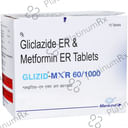
₹141.2
MRP ₹172.2
Gliclazide 80mg + Metformin 500mg

₹67.4
₹42.4
MRP ₹106
Gliclazide 80mg + Metformin 500mg

₹37.9
₹42.4
MRP ₹106
Gliclazide 80mg + Metformin 500mg

₹43.8
₹42.4
MRP ₹106
Gliclazide 80mg + Metformin 500mg

₹45
₹42.4
MRP ₹106
Gliclazide 80mg + Metformin 500mg

₹82
₹42.4
MRP ₹106
Gliclazide 30mg + Metformin 500mg

₹125.2
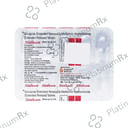
₹64.8
MRP ₹79
Gliclazide 30mg + Metformin 500mg

₹65.6

₹64.8
MRP ₹79
Gliclazide 60mg + Metformin 1000mg
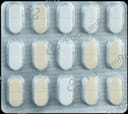
₹298.1

₹141.2
MRP ₹172.2
Gliclazide 40mg + Metformin 500mg
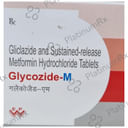
₹69.6
MRP ₹84.9
Gliclazide 80mg + Metformin 500mg

₹72
₹42.4
MRP ₹106
Gliclazide 80mg + Metformin 500mg

₹58
₹42.4
MRP ₹106
Gliclazide 80mg + Metformin 500mg

₹40.8
₹42.4
MRP ₹106
Gliclazide 80mg + Metformin 500mg

₹102
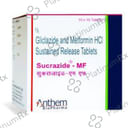
₹74.5
MRP ₹90.9
Gliclazide 40mg + Metformin 500mg
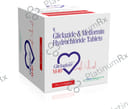
₹69.8
MRP ₹139.7
Gliclazide 80mg + Metformin 500mg

₹290
₹42.4
MRP ₹106
Gliclazide 80mg + Metformin 500mg

₹150.8
₹42.4
MRP ₹106
Gliclazide 60mg + Metformin 1000mg

₹223.7

₹141.2
MRP ₹172.2
Gliclazide 60mg + Metformin 500mg

₹240.8

₹60.9
MRP ₹121.9
Gliclazide 60mg + Metformin 500mg

₹201.6

₹60.9
MRP ₹121.9
Gliclazide 80mg + Metformin 500mg

₹74.5
MRP ₹90.9
Gliclazide 60mg + Metformin 500mg

₹164

₹60.9
MRP ₹121.9
Gliclazide 60mg + Metformin 500mg

₹138.5

₹60.9
MRP ₹121.9
Gliclazide 60mg + Metformin 500mg

₹135

₹60.9
MRP ₹121.9
Gliclazide 80mg + Metformin 500mg
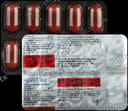
₹119.1

₹74.5
MRP ₹90.9
Flat ₹100 off on first app order | Use Code: APP100 |
Flat ₹100 off on first app order
USE CODE: APP100

Download Now